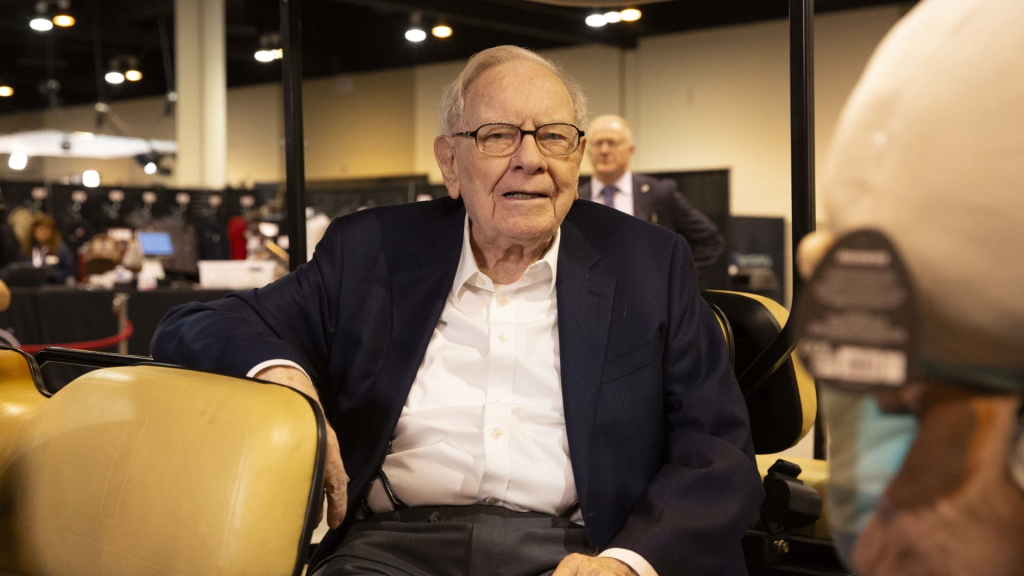(Stay updated with our comprehensive coverage of Berkshire Hathaway’s annual meeting here. Warren Buffett is scheduled to begin speaking at 9 a.m. ET.)
Berkshire Hathaway, led by Warren Buffett, released its first-quarter financial results on Saturday, revealing a significant decline in operating earnings compared to the same period last year. The diversified conglomerate, which includes industries such as insurance, transportation, energy, and retail, also cautioned that tariffs might further impact its profitability moving forward.
The company reported operating earnings of $9.64 billion for the first three months of 2025, a 14% decrease from the $11.22 billion recorded in the first quarter of 2024.
On a per-share basis, operating earnings for the recent quarter were $4.47, down from $5.20 per class B share a year earlier. These figures fell short of analysts’ expectations, with UBS estimating $4.89 and a consensus estimate of $4.72 per share from four analysts surveyed by FactSet.
A dramatic 48.6% drop in insurance-underwriting profit primarily contributed to this decline, with profits falling to $1.34 billion in the first quarter, down from $2.60 billion a year earlier. The company also noted that catastrophic events in the current accident year led to incurred losses of $1.1 billion due to devastating wildfires in Southern California.
The company faced additional pressure as the U.S. dollar depreciated in value during the first quarter, resulting in an approximate loss of $713 million related to foreign exchange. In the previous year, Berkshire had benefitted from a forex gain of $597 million.
During this time, the dollar index fell nearly 4%, with a 4.6% decline against the Japanese yen.
Impacts of Tariff Disruptions
Berkshire Hathaway stated that tariffs instituted by former President Donald Trump, along with other geopolitical risks, have created uncertainty for the company, which owns various enterprises, including the BNSF railway, Brooks Running, and Geico insurance. The conglomerate indicated that it currently cannot gauge the potential effects of these tariffs on its operations.
“Our periodic operating results may be impacted in future periods as a result of macroeconomic and geopolitical events, as well as changes in both industry and company-specific factors,” the company noted in its earnings report. “The dynamics surrounding these factors, including international trade policies and tariffs, have evolved rapidly in 2025. There is significant uncertainty regarding the eventual outcomes of these situations.”
“At this time, we are unable to provide a reliable forecast on how our businesses may be influenced, whether through changes in product costs, supply chain efficiency, or customer demand,” the report stated.
This earnings report arrives as Berkshire Hathaway has seen impressive year-to-date performance, while the broader market has struggled. In 2025, Class A shares of Berkshire have risen nearly 19%, while the S&P 500 has decreased by 3.3%, with tariff uncertainties weighing on technology and other sectors.
The company’s cash reserves have also reached a new high, surpassing $347 billion, up from approximately $334 billion at the end of 2024, as Buffett continues to search for viable investment opportunities.
For the tenth consecutive quarter, Berkshire was a net seller of stocks.
Overall earnings fell nearly 64% year-on-year, largely due to declines in Buffett’s publicly traded portfolio at the start of the year. Nonetheless, the company regularly advises investors to disregard short-term quarterly fluctuations.
“The investment gains or losses reported in any given quarter can often be misleading, particularly for those without a strong grasp of accounting principles,” Berkshire’s statement read.
— Reporting contributed by Yun Li of Finance Newso.


























